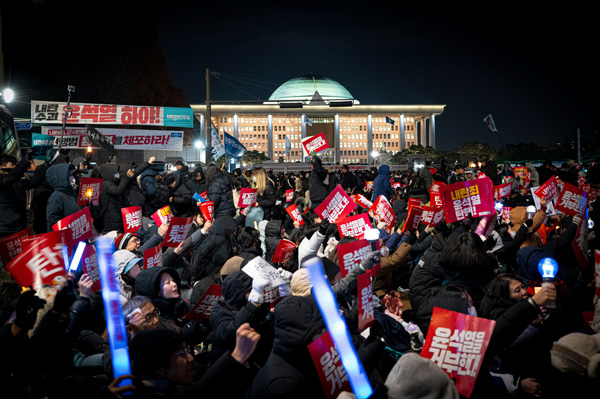South Korea considers stricter eligibility rules

[Protests at South Korea’s National Assembly. Photo Credit to Unsplash]
In recent months, concerns have grown after it was reported by many media outlets that 86 out of 300 members elected to the 22nd National Assembly have criminal records, representing 28.67% of all parliamentarians.
This is a slight improvement from the 21st election at 33.2%, with the majority of cases (56.7%) involving property crimes, election violations, crimes against people’s livelihood, and other offenses.
This situation has prompted calls for reform as South Korea prepares for its next presidential election.
With an increasing number of politicians having criminal records, many think raising eligibility standards is important to rebuild trust in the political system.
One prominent case involves Lee Jae-myung, the former leader of the Democratic Party, who has been criticized for his past drunk driving offenses.
Some people believe that having this kind of record could raise concerns about a candidate's ability to responsibly serve in public office.
According to the National Civil Service Act, elected officials like the president, members of parliament, and local governments are civil servants who should have higher moral and ethical standards.
However, the current election law has more limited restrictions on eligibility for election than for the disqualification from civil service.
The discrepancy between people who cannot be appointed as public officials but can still run for public office has continuously been raised as a concern.
In response to these issues, Representative Min Jeong Kim of the conservative party has suggested a change to the election law to stop people with serious criminal records from running for office.
Her proposed legislation includes stricter measures targeting serious offenses.
The new bill would ban candidates who committed crimes like child sex offenses or broke the National Security Act.
This suggestion also stops people who are not allowed to be public servants from becoming candidates.
In some cases, like crimes against minors, the ban could last up to 20 years after the sentence.
The goal is to make sure public officials meet higher moral standards and to build public trust.
South Korea is not alone in tackling this issue.
Brazil, for example, passed the Clean Record Law in 2010 to stop corrupt politicians from running for office to ensure that the country is run by people who act appropriately.
Under this law, anyone convicted of serious crimes like corruption, abuse of power, or money laundering cannot run for public office for eight years after their conviction.
The law applies even if the conviction is not final, as long as it was confirmed by a panel of judges.
This rule was strongly supported by the public and is seen as a key step to improve trust in Brazilian politics.
In South Korea, the recent impeachment of President Yoon has brought attention to this issue about who should be allowed to run.
As this is an early election, the elected president will begin their term immediately without a separate presidential transition committee.
Many high-government officials are announcing their candidacy and setting up for formal candidate registration.
Political analysts suggest that making the rules stricter is an important way to help restore trust in politics.

- Danny Jung / Grade 11 Session 2
- Belmont Secondary School

![THE HERALD STUDENT REPORTERS [US]](/assets/images/logo_student_us.png)
![THE HERALD STUDENT REPORTERS [Canada]](/assets/images/logo_student_ca.png)
